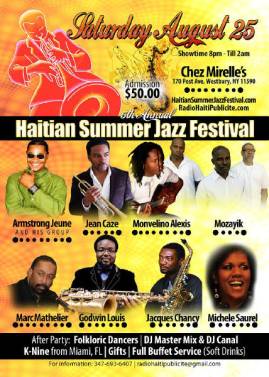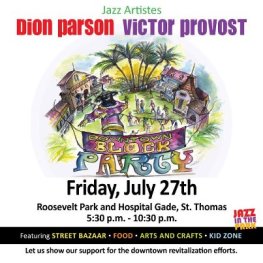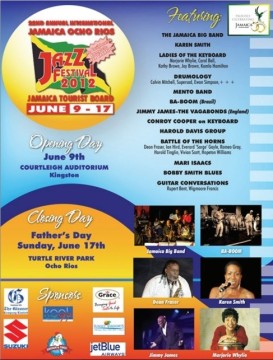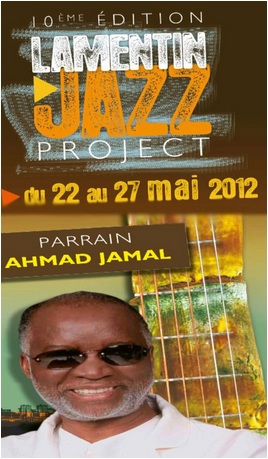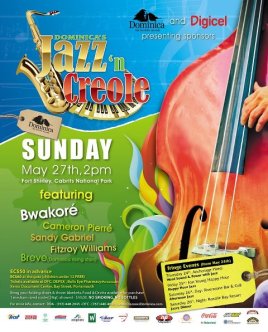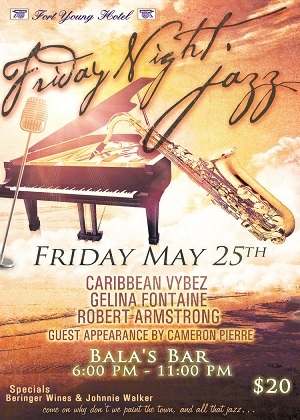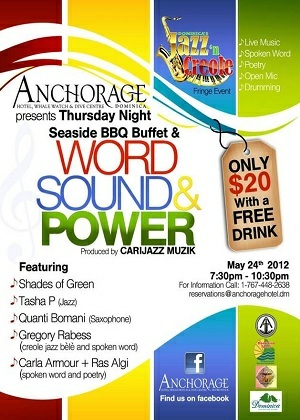
Four months ago, almost to the day, Jamaica’s preeminent Jazz pianist Monty Alexander presented what I would call a “double band” – one part Jazz, one part Jazz-Reggae at Anguilla’s Tranquility Jazz Festival 2007. It was a marvellous experience for me, one in which Alexander weaved the Jazz with Reggae, the foremost genre of his homeland, both seamlessly and with respect to both styles of music.
Alexander does it again, but with a twist. This time, he will bring Jazz, Trinidad’s Calypso and Jamaican Mento to the boil at Jazz at Lincoln Center for two consecutive nights, Friday, March 07th and Saturday, March 08th. The concert will be done in two distinct sections using different ensembles for each of the two styles of music. At the core of it all will be Alexander’s trio compromising of Herlin Riley on drums and Hassan Shakur (whom we saw in Anguilla) on bass.
“In Trinidad, Calypso can be traced to the Carnival celebrations dating back to the 19th century,” says Alexander in describing the confluence of Calypso and Mento with Jazz. “Although American record companies often used (the) term Calypso to sell all Caribbean folk music, including Mento, Calypso is a Trinidadian music in the strict sense. Mento on the other hand is a deep country Jamaican thing. ‘Deep inna de bush’ as we say.”
Trinidad Calypso was heavily influenced by Jazz brought to the island by American soldiers before and during the Second World War and heard on radio broadcasting out of Miami and New Orleans.
Thus Jazz improvisation became another aspect of the Calypso canon that was grounded in social commentary and the wry and sometimes insulting extemporaneous wit. Jazz writer Carter Van Pelt informs that this is called ‘Sans Humanit.’
Eventually, Jazz made its way on the Calypso recordings of Trinidadians Lionel Belasco and Sam Manning, in the pre-war era, and Lord Kitchener, following.
Of Mento, Van Pelt writes, “As Alexander explains, Jamaican Mento evolved from the French Quadrille dance music that was fashionable among the English colonists in the 19th century. Even though Trinidad and Jamaica were both English (and Protestant) colonies before independence in the 1960s, Trinidad was in Spanish (Catholic) hands more than 100 years longer than Jamaica and also had a French presence… Both Calypso and Mento emerged from the same sets of circumstances and a similar cultural process that produced Jazz in New Orleans at the turn of the 19th century.”
Alexander: “Throughout my career, the music of Jamaica and Trinidad has remained very dear to me because of my fond memories of hearing Lord Kitchener, Harry Belafonte, the Mighty Sparrow, Lord Flea, Lord Melody, Alerth Bedasse, and scores of others as I grew up in Kingston. “These two styles of music, Calypso and Mento, express a joy and love of life that I hope to recapture during the performances at Jazz at Lincoln Center” on Friday 07th and Saturday 08th, 2008.
“In Jamaica, a lot of the musicians who were involved with the birth of the recording industry in the late 1950s saw themselves as Jazz men. They really wanted to swing, and they did, but the development of Ska was just natural because they couldn’t help but put their Jamaican identity into it,” says Alexander. These musicians included guitarist Ernest Ranglin, trombonists Don Drummond and Rico Rodriguez, and saxophonists Cedric Brooks, Val Bennett, Roland Alphonso, and Tommy McCook.
Van Pelt notes that several of these horn players were members of local Jamaican big bands who would go on to form the internationally acclaimed Skatalites. Bob Marley was backed up by The Skatalites when he first came on the scene. For its part, the Skatalites is credited as the band that gave Jamaican music a national identity in the post-independence years. There was also the Mystic Revelation of Rastafari that was co-founded by Cedric Brooks with drummer Count Ossie.
“We chose the title ‘Lords of the West Indies’ because many of the music’s stars used that particular honorific, and all of them can be seen as West Indian cultural royalty, having first introduced the English-speaking islands to people around the world.”
The modern day Lords who will pay tribute to that “cultural royalty” are David “Happy” Williams on vocals and bass, the young Trinidadian trumpeter Etienne Charles, trombonist Clifton Anderson, tenor saxophonist Charles Dougherty, and singer Keith Prescott, a.k.a. Designer for the Calypso side. The Mento group will be alto saxophonist Dean Fraser, tenor saxophonist Cedric I.M. Brooks, Carlton James on banjo, Joseph Bennett on shakers, and Albert Morgan on the rhumba box, which is like an African bass kalimba. Jamaica’s Desi Jones (drums) and Pluto Shervington (vocals and guitar) will be a part of both ensembles for they are said to be versed in both styles of music.


Bass Kalimba
To quote one last time from Van Pelt’s article, Lords of the West Indies: The Cultural Intersections of Jazz and the English-Speaking Caribbean: “Jazz at Lincoln Center will bring the various traditions into focus for the first time on one of the world’s most important stages.”
___________________________

The Lords of the West Indies performed in the Allen Room of the Frederick P. Rose Hall, Broadway at 60th Street Friday 07th and Saturday 08th. Absorb the following reviews of the weekend shows of Monty Alexander’s “Lords of the West Indies” at Jazz at Lincoln Center from Outside the Woodshed. The first one out was written by New York City Jazz Critic Will Friedwald, courtesy of bloodandfire.co.uk.
The second is taken from www.mentomusic.com/samManning.htm. To get right to the mentomusic review will take some scrolling because it is buried in a longer document. For this reason, we have excerpted the review of The Lord of the West Indies, Monty Alexander (with light edits) for your convenience. You still have to go to the site for the full review, which includes photos of the show.

18.418901
-64.576070







